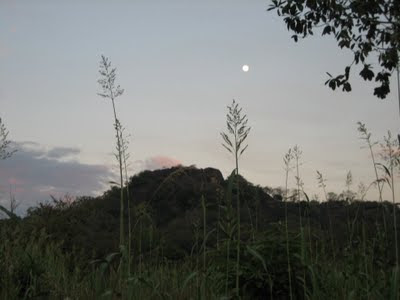The first term at Mundri Secondary School is now complete. There will only be two terms this year instead of the usual three terms because of the teachers strike at the beginning of the school year. My class has moved through the introduction to physics and has started learning the equations of linear motion.
I was surprised by how much I enjoyed teaching physics this term. The teaching part was difficult for me, but I really had fun with the physics. Although I have tutored before and even worked as a TA (teaching assistant) in college, I have never taught a class for a full school year. There were many moments when I was standing at the chalk board at a complete loss for any other way to explain a concept that none of the students were understanding. Physics is a difficult subject for most students, and the students in my class have the added challenge of understanding my English which is very different from the English they are used to hearing.
As with most times when I have done something outside of my comfort zone, teaching has been a means for God to show me the ugliness in my own heart, especially my impatience. It has also been an opportunity to trust that God is working even when I can't always see the evidence.

A few weeks ago I was able to invite all the girls from my class over to our compound for an afternoon of science demonstrations, conversation, and popcorn. I loved seeing them observe carefully and ask themselves why the raisins "dance" or the pepper "runs away" from my hand. With a smaller group I was able to have fun with science and ask questions in a way that would be difficult to manage alone in a class of almost 60 students.
Now that the term is over and I have graded all the exams, I suspect that most of the students have learned more math and English in my class than they have physics, which is fine with me. There are few students who have worked hard, asked questions, and learned the basics of physics. I am very proud of those students. I also saw from the exams that I am going to have to review the equations of linear motion from the beginning when the next term starts in January.
After I gave the final exam for this term, I asked all the students to write about their goals for their future. I would like to share a few of their answers with you.
"My goal is to be an engineering worker according to God's will if I may stay alive from now and future. I always practice some work like connection of electricity in my house, sometimes I cut some trees to burn them as charcoal so as to get some money for school fees. I also practice farming. I have one hectare of eggplant in my garden with a few tomatoes in one side"
"My goal is to be a pastor to preach the word of God because I like to read the Bible every day."
"My goal is to be a teacher to teach our children in our society because 21 years we spent in civil war. My goal is that if God will help me, I will finish my education."
"My future goal is to be a business man after studying. The reason is that I want to help my family at large. I want to support my brother to study also like me. Business is very important for our life in the , I want to overcome the poverty in our society."
"My goal is nothing because there is no work to do. I was working in a farm, but there is nothing in it. That is my condition, and even I don't have anybody to pay school fees. Now I struggle to do some work like burning of charcoal, cutting poles, but there is less money. I will either finish my education or not. I am trying to get some work like engineering or driving."
I ask that you would pray for all the students to have hope for their futures that comes from the truth of the gospel. I also ask that you would pray for wisdom for me as I plan for the next term.











